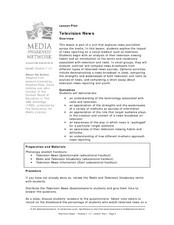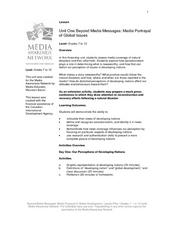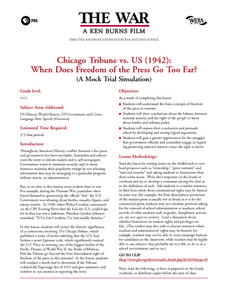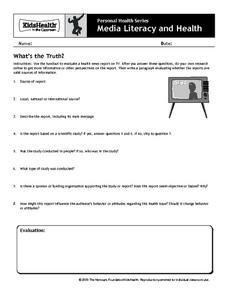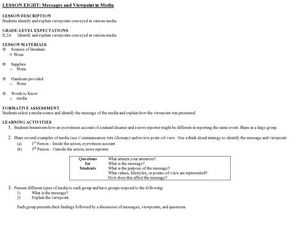Curated OER
Fighting Fake News
Fake news. Alternative facts. Internet trolls. In an age of Newspeak, it's increasingly important to equip 21st century learners with the skills needed to determine the legitimacy of claims put forth on social media, in print, and in...
The New York Times
Evaluating Sources in a ‘Post-Truth’ World: Ideas for Teaching and Learning about Fake News
The framers of the United States Constitution felt a free press was so essential to a democracy that they granted the press the protection it needed to hold the powerful to account in the First Amendment. Today, digital natives need to...
PBS
How to Teach Your Students about Fake News
What media literacy skills do people need to evaluate a news source? Scholars listen to and discuss an NPR story about how fake headlines often dupe young people and adults alike. Next, they study news stories, using a fact-checking...
Reporters Without Borders
2017 World Press Freedom Index
Freedom of the press was seen as a right so important that the Founding Fathers listed it as part of the first amendment to the United States Constitution. Americans pride themselves on this freedom, but just how free are American...
Newseum
E.S.C.A.P.E. Junk News
Fair, balanced, and reputable information? There's an acronym for that! Scholars learn the E.S.C.A.P.E. method for evaluating news sources. Then, pupils work in small groups to read and analyze a news story and discuss the activity to...
Curated OER
Television News
Different media sources portray news in a variety of ways. In groups of three, learners look at different news sources, bringing in all the findings the next day. Three handouts help scholars compare sources, define specific terms used...
Deliberating in a Democracy
Free and Independent Press
Students determine how free press principles can be compromised. For this global studies lesson, students read an article titled "Free and Independent Press." Students respond to discussion questions regarding the article.
Facing History and Ourselves
Free Press Makes Democracy Work
A unit study of the importance of a free press in a democracy begins with class members listening to a podcast featuring two journalists, one from a United States public radio station and one from Capetown, South Africa. The...
Curated OER
Beyond Media Messages: Media Portrayal of Global Issues
Take a close look at news reporting techniques and global issues. Begin by creating a graphic representation of developing nations and defining the term. After class discussion, the second day's activities pick up by deconstructing news...
American Press Institute
Newspapers in Your Life: What’s News Where?
Big news isn't necessarily newsworthy everywhere! How do journalists decide what to cover with so much happening around them? A instructional activity on media literacy examines the factors that affect the media's choice of stories to...
Curated OER
Information Overload: Looking at News
How do events reported in mainstream newspapers, on television news, blog posts, and social network sites differ? Ask your class to investigate the way the same news item is presented in the many information sources available. Groups...
News Literacy Project
News Judges
Order in the court! Scholars act as news judges, learning how to analyze the newsworthiness of several pieces of information. Working in small groups, they determine which events are most newsworthy and then complete graphic organizers...
Newseum
Today's Front Pages
Take a close look at a number of newspapers with collection of lessons and activities. Using a poster (which can be found under the materials tab), learners examine the hard copy of a local newspaper. This leads into an exploration of...
Curated OER
Press Review
How can word choice affect a political speech? Middle and high schoolers examine the text of the 1999 State of the Union Address, and then determine how newspaper articles and television reports describe and analyze the event. Use this...
Social Media Toolbox
Social Media Roles
Social media has changed the news publishing process, so how does it affect school news publications? Lesson nine in a 16-part series titled The Social Media Toolbox explores the traditional publishing roles through the lens of social...
Curated OER
Using the News in Class
Students listen to international news stories. Students use context clues to determine the meaning of vocabulary words from context, then complete a matching exercise to see if their vocabulary definitions were correct. Students...
Curated OER
Chicago Tribune vs. US (1942): When Does Freedom of the Press Go Too Far?
Students define freedom of the press in peace and war time. As a class, they identify the need for the public to be informed, but discuss where the line should be drawn to protect national security. They develop their arguments and...
Nemours KidsHealth
Media Literacy and Health: What’s the Truth?
In this personal health media literacy activity, students use the eight questions on this sheet to evaluate a health news report on television. Students write paragraphs the determine whether the reports are valid sources of information.
Media Smarts
Media Awareness Network: Hate or Debate?
Discuss the difference between legitimate debate on a political issue and arguments that are based on hate through a science-fiction scenario that shows how a controversial issue can be discussed in both ways. Then learn how purveyors of...
Newseum
Media Ethics: Fairness Formula Starts With Accuracy
As part of a study of media ethics, young journalists apply a fairness formula to news reports. They look at accuracy, balance, completeness, detachment, and ethics to determine if the reporting is fair.
Newseum
Media Mix-Ups Through History: Analyzing Historical Sources
Scholars use the E.S.C.A.P.E. (Evidence Source, Context, Audience, Purpose, Execution) strategy to analyze a historical source to determine why mistakes happen in news stories. They then apply the same strategies to contemporary flawed...
Curated OER
Messages and Viewpoint in Media
Explore media point of view. In this literacy and current events lesson, pupils identify examples of first and third person point of view in media articles. They analyze examples of media, interpret the messages, and determine purposes...
Curated OER
Mapwork: A Place In the News
Students determine how to find geographic information about places they read about in the news. In this geography lesson, students look at political and physical maps to determine the difference. They access maps online to find the...
Teaching Tolerance
Journalism for Justice
Roll the presses! Or at least have your class members participate in the time-honored tradition of the student press by creating their own newspapers or journalist pieces on a social problem. After conducting research and collaborating...







